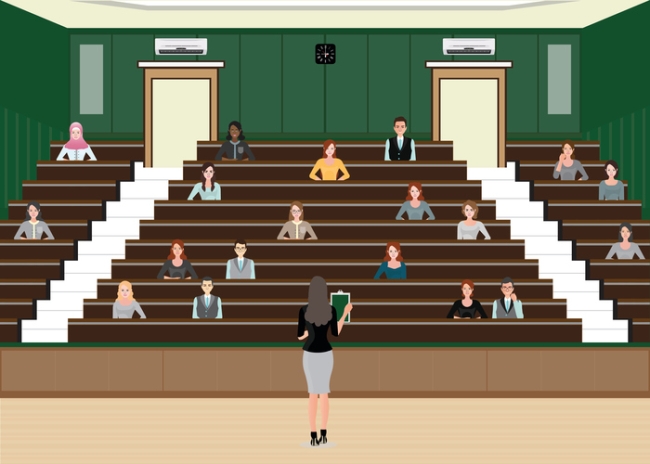You have /5 articles left.
Sign up for a free account or log in.

iStock/Zentangle
“Oh, you’re getting an Ed.D.? You know that’s not a Ph.D., right?”
Dr. T said this casually as he scrolled through his notes during a brief meeting with me in his office one warm afternoon in May. I held in my desire to say, “What? It’s not? Thank heavens you’ve informed me!”
But really, I know Dr. T doesn’t mean anything bad by this. He’s a smart guy but not a great communicator. Instead I say, “That’s right. I’m excited about it. The Ed.D. program fits well with what I want to do.”
My path into this program has been an adventurous (and atypical) one -- leading me through jobs in advertising, public relations and the technology field, and then through a master’s degree in communication. My narrative during this journey has constantly been, “Someday, I’d like to teach college students. That’s the dream.” Joyfully, a teaching assistantship during my master’s -- and now, as I pursue my doctorate -- has allowed me to do just that. I’ve found that there are few things sweeter than a fall-semester freshman who stops by to say, “Thanks, you’re the one teacher who knew my name this semester,” and few things funnier than the air of bravado in spring-semester freshmen, who let me know they are already very wise and experienced.
As I began courses in the Ed.D. program, I looked forward to studying the momentous figures that shaped American curriculum, researching how societal problems have warped our school system and identifying paths between the fields of education and communication. I did not, however, plan on learning much about teaching. My view was: “I’m already a great teacher. I was made to do this. Maybe other students need advice on teaching, but I don’t.”
Looking back, that attitude is part comical, part mortifying. While I have yet to take a class “on teaching,” the depth of understanding I have gained about the practices of teaching and learning in my education classes is immeasurable. By engaging in heartfelt dialogue with other teachers about their practices, concerns and aspirations, and by critically examining texts about the experiences of teaching, I have begun to see my role in the classroom -- and the purpose of education -- through a new lens.
While the rest of this article could easily transform into an ode of thanks to the fellow teachers I have met in my courses, I think it’s important to instead examine the underlying question: Why did I think I wouldn’t learn anything about teaching?
As it turns out, I’m not alone in assuming that confidence in my teaching style put me above the need to grow pedagogically. While I would never describe educational development as “claptrap and balderdash,” the suggestion that I might need to improve my teaching somehow hits below the belt. Admitting to learning and growing in teacher education might simultaneously make me confess that I am not the perfect teacher. Maybe it is this fear of perceived weakness that prevents many postsecondary faculty members from ever taking a class about teaching.
If we’re in higher education to educate, what keeps college teachers from learning more about teaching? You’re busy. You’ve been doing this a long time. It’s really up to the students to learn the material. You’re already an excellent lecturer. Anyone can teach; it’s not that complicated. While those phrases begin to scratch the surface, I propose we take a step back to examine the internal narratives and pervading ideologies that surround our ideas about teaching at the university.
Three Myths
In her 2003 text Practice Makes Practice, Deborah P. Britzman, a professor at York University in Toronto, describes three myths that summon teachers to the field of education: 1) everything depends upon the teacher, 2) the teacher is the expert and 3) teachers are self-made. While Britzman’s audience is largely teachers at the primary and secondary levels, these myths abound in higher education, as well.
Britzman describes the concept of “everything depends on the teacher” as a power struggle in the classroom, constructing “learning as synonymous with control.” Perhaps it is this desire for authority that has encouraged the lecture as the predominant form of teaching since the foundation of the university. While lectures can certainly have their place in the instructional landscape, they also ensure that only the professor’s voice is heard. Students are not encouraged to bring their own knowledge into the classroom but are expected to function as open vessels, waiting to be filled by the sage.
Similarly, professors at a university are typically required to wear two hats: one hat as a researcher and another as a teacher. But only the researcher hat is fashionable. It brings in money for the university, it looks good on a curriculum vitae and it promotes the climb up the academic latter.
In contrast, the teacher hat is slumpy. It’s necessary but not pretty. It’s the kind of hat you wear grocery shopping hoping no one will recognize you. The fancy hat promotes the educator as the expert, while the slumpy hat is seen as “just” teaching. This distinction fosters the idea that teaching is easy and requires little effort. The uncomfortable adage “those who can’t do, teach” suggests that research is “doing,” while teaching is a second-rate activity.
That leads into Britzman’s third myth: the teacher is self-made. It is the myth I cling to most strongly. If I have the it factor, if I bring my own experiences into the classroom, if I connect with my students, then I have the ingredients I need to make myself into a teacher.
While I do believe that passion and dedication are two important elements of teaching, I have found the mantra of “self-creation” lives simultaneously with “self-perfection.” This myth minimizes the role of teacher education and the experiences of others, and instead promotes my personal knowledge as the pedagogical apex.
I have found that the more I loosen my grip on these myths as ideals, the easier it has been to explore and embrace a new narrative shaping itself in me: “I don’t know everything, and that’s OK.”
At the university level, we pride ourselves on encouraging our students to engage in critical thinking, challenging each of them to “think for yourself!” Paradoxically, I have found that thinking for myself has also meant thinking with others. While academics are routinely encouraged to submit and share their research, we are rarely supported to engage in this type of dialogue about our teaching.
Instead of holding our myths tightly, let’s practice what we tell our students to do and explore how the activity of teaching is so much deeper than we give it credit for. Let’s determine that in teaching, just like research, there is value in learning from others. Let’s loosen our grip and decide that it might just be worth it to take an education class. I’m looking at you, Dr. T.








